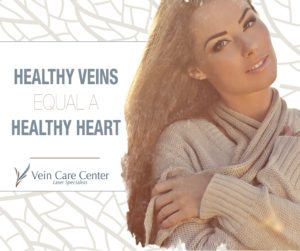Healthy Veins = A Healthy Heart

You probably know that a healthy heart is imperative for a long, productive life. Cardiovascular disease is the number one cause of death in the U.S., accounting for about 801,000 deaths in this country every year, according to the American Heart Association. Around 2,200 people die of cardiovascular disease every day, which is more than cancer and chronic respiratory diseases combined. While a healthy heart cannot be understated, the relationship between the heart and veins is often overlooked.
The Job of the Veins
Your veins are responsible for carrying deoxygenated blood back to the heart after the arteries carry the blood with oxygen and other vital substances throughout the body. The heart pumps the blood through the arteries, giving them the boost necessary to keep the blood moving smoothly. The veins do not have the advantage of the heart’s assistance in moving blood back through all the areas to the center of the body – the heart and lungs. Instead, these vessels contain tiny valves that help transfer the blood in a uniform direction to where it needs to go.
When the Veins Don’t Function
Over time, those valves inside the veins can start to wear out due to all the hard work they put in throughout your lifetime. This is especially true in the veins of the lower leg, where the movement becomes even more challenging as the vessels work against gravity and your body’s weight to move blood in an upward direction. As the valves stop working properly, blood starts to pool within the vessel, which leads to weakening and swelling of the vein. This indicates the pressure inside the vein is increasing, throwing off the balance of the vascular system overall.
The Condition and the Risks
The process that occurs as the valves stop working efficiently is a diagnosable condition known as chronic venous insufficiency or CVI. You may notice symptoms of CVI begin to develop, such as pain and heaviness in the legs at the end of the day. You may also see visible veins form on the outside of the legs, known as spider or varicose veins. These signs let you know that the veins in the legs are not working as well as they once did. However, it is difficult to know how much of an impact those leg veins are having on the health of the rest of your cardiovascular system, including your heart.
Keeping the Heart Healthy
Increased pressure inside the veins can affect blood flow throughout the cardiovascular system, even if the changes are subtle at first. Those varicose veins and uncomfortable symptoms can increase your risk for complications like the formation of blood clots inside the vessel, which in turn impedes blood flow. You might also experience enough pain in the legs that prohibits you from maintaining an active lifestyle, which also affects the health of your heart and the rest of your body.
Preventative Tips
Fortunately, many of the same steps you can take to keep your veins healthy will benefit your heart as well:
- Get some physical activity daily
- Maintain a healthy weight
- Eat a diet rich in fruits, vegetables and whole grains
- Remain hydrated by drinking plenty of water daily
- Quit smoking if you smoke now
- Have your veins evaluated regularly by a specialist
If your doctor diagnoses you with CVI or other vein disorders, there are many noninvasive methods of treating those conditions today to maintain the health of your vascular system. To schedule your vein assessment or learn more about the treatment options available, contact Vein Care Center today at 419-227-4472.
